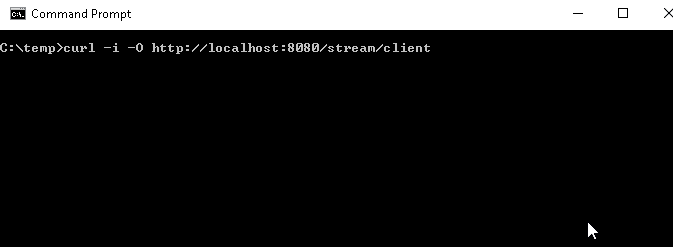I need to build a webservice with Jersey that downloads a big file from another service and returns to the client. I would like jersey to read some bytes into a buffer and write those bytes to client socket.
I would like it to use non blocking I/O so I dont keep a thread busy. (This could not be achieved)
@GET
@Path("mypath")
public void getFile(final @Suspended AsyncResponse res) {
Client client = ClientBuilder.newClient();
WebTarget t = client.target("http://webserviceURL");
t.request()
.header("some header", "value for header")
.async().get(new InvocationCallback<byte[]>(){
public void completed(byte[] response) {
res.resume(response);
}
public void failed(Throwable throwable) {
res.resume(throwable.getMessage());
throwable.printStackTrace();
//reply with error
}
});
}
So far I have this code and I believe Jersey would download the complete file and then write it to the client which is not what I want to do. any thoughts??
The client side async request, isn't going to do much for your use case. It's more mean for "fire and forget" use cases. What you can do though is just get the InputStream from the client Response and mix with a server side StreamingResource to stream the results. The server will start sending the data as it is coming in from the other remote resource.
Below is an example. The "/file" endpoint is the dummy remote resource that serves up the file. The "/client" endpoint consumes it.
@Path("stream")
@Produces(MediaType.APPLICATION_OCTET_STREAM)
public class ClientStreamingResource {
private static final String INFILE = "Some File";
@GET
@Path("file")
public Response fileEndpoint() {
final File file = new File(INFILE);
final StreamingOutput output = new StreamingOutput() {
@Override
public void write(OutputStream out) {
try (FileInputStream in = new FileInputStream(file)) {
byte[] buf = new byte[512];
int len;
while ((len = in.read(buf)) != -1) {
out.write(buf, 0, len);
out.flush();
System.out.println("---- wrote 512 bytes file ----");
}
} catch (IOException ex) {
throw new InternalServerErrorException(ex);
}
}
};
return Response.ok(output)
.header(HttpHeaders.CONTENT_LENGTH, file.length())
.build();
}
@GET
@Path("client")
public void clientEndpoint(@Suspended final AsyncResponse asyncResponse) {
final Client client = ClientBuilder.newClient();
final WebTarget target = client.target("http://localhost:8080/stream/file");
final Response clientResponse = target.request().get();
final StreamingOutput output = new StreamingOutput() {
@Override
public void write(OutputStream out) {
try (final InputStream entityStream = clientResponse.readEntity(InputStream.class)) {
byte[] buf = new byte[512];
int len;
while ((len = entityStream.read(buf)) != -1) {
out.write(buf, 0, len);
out.flush();
System.out.println("---- wrote 512 bytes client ----");
}
} catch (IOException ex) {
throw new InternalServerErrorException(ex);
}
}
};
ResponseBuilder responseBuilder = Response.ok(output);
if (clientResponse.getHeaderString("Content-Length") != null) {
responseBuilder.header("Content-Length", clientResponse.getHeaderString("Content-Length"));
}
new Thread(() -> {
asyncResponse.resume(responseBuilder.build());
}).start();
}
}
I used cURL to make the request, and jetty-maven-plugin to be able to run the example from the command line. When you do run it, and make the request, you should see the server logging
---- wrote 512 bytes file ----
---- wrote 512 bytes file ----
---- wrote 512 bytes client ----
---- wrote 512 bytes file ----
---- wrote 512 bytes client ----
---- wrote 512 bytes file ----
---- wrote 512 bytes client ----
---- wrote 512 bytes file ----
---- wrote 512 bytes client ----
...
while cURL client is keeping track of the results

The point to take away from this is that the "remote server" logging is happening the same time as the client resource is logging. This shows that the client doesn't wait to receive the entire file. It starts sending out bytes as soon as it starts receiving them.
I used a very small buffer size (512) because I was testing with a small (1Mb) file. I really didn't want to wait for a large file for testing. But I would imagine large files should work just the same. Of course you will want to increase the buffer size to something larger.
In order to use the smaller buffer size, you need to set the Jersey property ServerProperties.OUTBOUND_CONTENT_LENGTH_BUFFER to 0. The reason is that Jersey keeps in internal buffer of size 8192, which will cause my 512 byte chunks of data not to flush, until 8192 bytes were buffered. So I just disabled it.
When using AsyncResponse, you should use another thread, as I did. You may want to use executors instead of explicitly creating threads though. If you don't use another thread, then you are still holding up the thread from the container's thread pool.
Instead of managing your own threads/executor, you can annotate the client resource with @ManagedAsync, and let Jersey manage the threads
@ManagedAsync
@GET
@Path("client")
public void clientEndpoint(@Suspended final AsyncResponse asyncResponse) {
...
asyncResponse.resume(responseBuilder.build());
}
If you love us? You can donate to us via Paypal or buy me a coffee so we can maintain and grow! Thank you!
Donate Us With